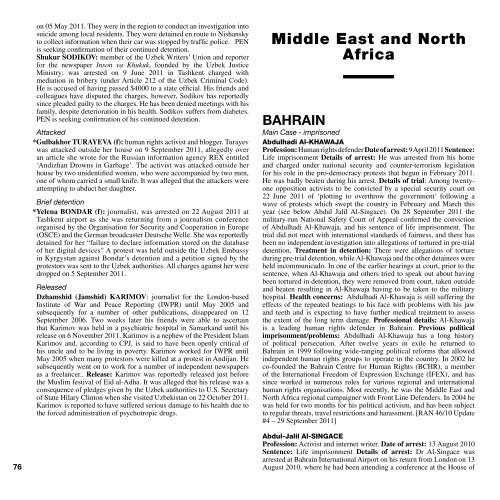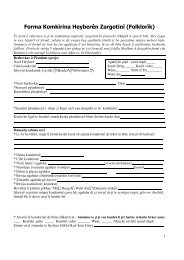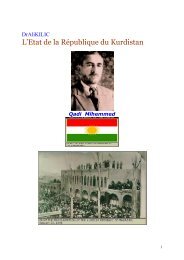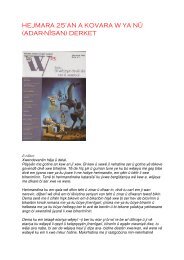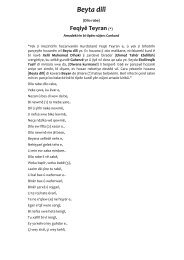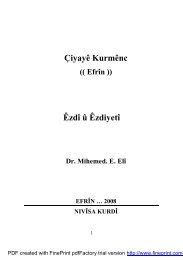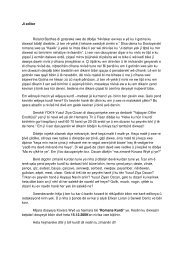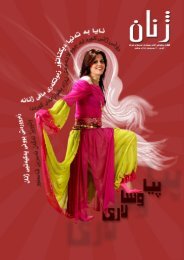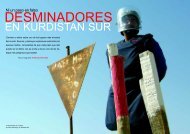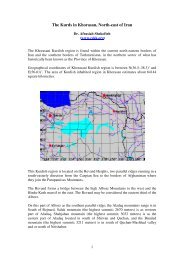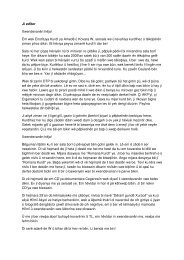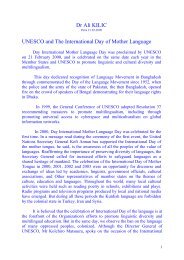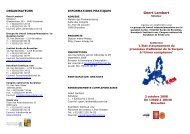Caselist - PEN International
Caselist - PEN International
Caselist - PEN International
Create successful ePaper yourself
Turn your PDF publications into a flip-book with our unique Google optimized e-Paper software.
76on 05 May 2011. They were in the region to conduct an investigation intosuicide among local residents. They were detained en route to Nishanskyto collect information when their car was stopped by traffic police. <strong>PEN</strong>is seeking confirmation of their continued detention.Shukur SODIKOV: member of the Uzbek Writers’ Union and reporterfor the newspaper Inson va Khukuk, founded by the Uzbek JusticeMinistry; was arrested on 9 June 2011 in Tashkent charged withmediation in bribery (under Article 212 of the Uzbek Criminal Code).He is accused of having passed $4000 to a state official. His friends andcolleagues have disputed the charges, however, Sodikov has reportedlysince pleaded guilty to the charges. He has been denied meetings with hisfamily, despite deterioration in his health. Sodikov suffers from diabetes.<strong>PEN</strong> is seeking confirmation of his continued detention.Attacked*Gulbakhor TURAYEVA (f): human rights activist and blogger. Turayevwas attacked outside her house on 9 September 2011, allegedly overan article she wrote for the Russian information agency REX entitled‘Andizhan Drowns in Garbage’. The activist was attacked outside herhouse by two unidentified women, who were accompanied by two men,one of whom carried a small knife. It was alleged that the attackers wereattempting to abduct her daughter.Brief detention*Yelena BONDAR (f): journalist, was arrested on 22 August 2011 atTashkent airport as she was returning from a journalism conferenceorganised by the Organisation for Security and Cooperation in Europe(OSCE) and the German broadcaster Deutsche Welle. She was reportedlydetained for her “failure to declare information stored on the databaseof her digital devices” A protest was held outside the Uzbek Embassyin Kyrgystan against Bondar’s detention and a petition signed by theprotestors was sent to the Uzbek authorities. All charges against her weredropped on 5 September 2011.ReleasedDzhamshid (Jamshid) KARIMOV: journalist for the London-basedInstitute of War and Peace Reporting (IWPR) until May 2005 andsubsequently for a number of other publications, disappeared on 12September 2006. Two weeks later his friends were able to ascertainthat Karimov was held in a psychiatric hospital in Samarkand until hisrelease on 6 November 2011. Karimov is a nephew of the President IslamKarimov and, according to CPJ, is said to have been openly critical ofhis uncle and to be living in poverty. Karimov worked for IWPR untilMay 2005 when many protestors were killed at a protest in Andijan. Hesubsequently went on to work for a number of independent newspapersas a freelancer.. Release: Karimov was reportedly released just beforethe Muslim festival of Eid al-Adha. It was alleged that his release was aconsequence of pledges given by the Uzbek authorities to U.S. Secretaryof State Hilary Clinton when she visited Uzbekistan on 22 October 2011.Karimov is reported to have suffered serious damage to his health due tothe forced administration of psychotropic drugs.Middle East and NorthAfricaBAHRAINMain Case - imprisonedAbdulhadi Al-KHAWAJAProfession: Human rights defender Date of arrest: 9 April 2011 Sentence:Life imprisonment Details of arrest: He was arrested from his homeand charged under national security and counter-terrorism legislationfor his role in the pro-democracy protests that begun in February 2011.He was badly beaten during his arrest. Details of trial: Among twentyoneopposition activists to be convicted by a special security court on22 June 2011 of ‘plotting to overthrow the government’ following awave of protests which swept the country in February and March thisyear (see below Abdul Jalil Al-Singace). On 28 September 2011 themilitary-run National Safety Court of Appeal confirmed the convictionof Abdulhadi Al-Khawaja, and his sentence of life imprisonment. Thetrial did not meet with international standards of fairness, and there hasbeen no independent investigation into allegations of tortured in pre-trialdetention. Treatment in detention: There were allegations of tortureduring pre-trial detention, while Al-Khawaja and the other detainees wereheld incommunicado. In one of the earlier hearings at court, prior to thesentence, when Al-Khawaja and others tried to speak out about havingbeen tortured in detention, they were removed from court, taken outsideand beaten resulting in Al-Khawaja having to be taken to the militaryhospital. Health concerns: Abdulhadi Al-Khawaja is still suffering theeffects of the repeated beatings to his face with problems with his jawand teeth and is expecting to have further medical treatment to assessthe extent of the long term damage. Professional details: Al-Khawajais a leading human rights defender in Bahrain. Previous politicalimprisonment/problems: Abdulhadi Al-Khawaja has a long historyof political persecution. After twelve years in exile he returned toBahrain in 1999 following wide-ranging political reforms that allowedindependent human rights groups to operate in the country. In 2002 heco-founded the Bahrain Centre for Human Rights (BCHR), a memberof the <strong>International</strong> Freedom of Expression Exchange (IFEX), and hassince worked in numerous roles for various regional and internationalhuman rights organisations. Most recently, he was the Middle East andNorth Africa regional campaigner with Front Line Defenders. In 2004 hewas held for two months for his political activism, and has been subjectto regular threats, travel restrictions and harassment. [RAN 46/10 Update#4 – 29 September 2011]Abdul-Jalil Al-SINGACEProfession: Activist and internet writer. Date of arrest: 13 August 2010Sentence: Life imprisonment Details of arrest: Dr Al-Singace wasarrested at Bahrain <strong>International</strong> Airport on his return from London on 13August 2010, where he had been attending a conference at the House ofLords during which he had criticised Bahrain’s human rights practices.He was initially accused of ‘inciting violence and terrorist acts’, beforebeing formally charged under national security and counter-terrorismlegislation. He and 21 other opposition activists on trial with him werefreed in February 2011 following widespread calls by anti-governmentprotestors for political reform and the release of political prisoners. Hewas re-arrested on 16 March 2011 after publicising the deterioratinghuman rights situation in the country, and was later placed under housearrest. Details of trial: Dr Al-Singace was among twenty-one oppositionactivists to be convicted by a special security court on 22 June 2011 of‘plotting to overthrow the government’ following a wave of protestswhich swept the country in February and March that year. Eight of thoseconvicted received life sentences, including Dr Al-Singace. A furtherten were sentenced to fifteen years in prison, two received five-yearterms and one a two-year prison sentence. The trial did not meet withinternational standards of fairness, and there has been no independentinvestigation into allegations of tortured in pre-trial detention Appeal:On 28 September 2011 the military-run National Safety Court of Appealconfirmed the conviction. Treatment in prison: Dr Al-Singace washeld incommunicado and in solitary confinement for six months, duringwhich he was reportedly ill-treated. Place of detention: Gurayn MilitaryPrison, Manama, Bahrain. Health concerns: Dr Al-Singace is disabled,and relies on a wheel-chair for his mobility. There are serious concernsfor his welfare in detention. Professional details: Dr Al-Singace taughtengineering at the University of Bahrain and authored his own blog(http://alsingace.blogspot.com/). He is head of the human rights office ofthe Haq Movement for Liberty and Democracy. [RAN 46/10 Update #4]Sentenced in absentiaAli ABDULEMAM: Blogger and author of the book Global VoicesAdvocacy was sentenced in absentia on 22 June 2011 to fifteen yearsin jail by a military court. Abdulemam was arrested on 4 September2010 by the Bahraini authorities for allegedly spreading “false news” onthe popular website BahrainOnline.org, which he founded in 1999. Hewas released in February 2011. After his release, he has avoided beingrearrested and has been in hiding. His arrest is believed to be linked to hissupport for 23 Shia activists currently detained on terrorism charges (see‘main case’ above). The website was closed on 5 September 2010. Otherinformation: Recipient of the 2011 Hellman/Hammett award.On trial*Zainab Al-KHAWAJA (f): Prominent blogger and activist, reportedlyarrested by security forces in Manama, the Bahraini capital, on 15December 2011 for her participation in a peaceful protest. A video ofZainab’s detention was widely circulated on the Internet. Charged withassaulting a police officer and taking part in an illegal protest. On 22December 2011 the Bahraini Public Prosecutor decided to release Zainabpending trial. Zainab is the daughter of human rights defender AbdulhadiAl-Khawaja, who is serving a life sentence for his peaceful oppositionactivities (see above: main case). (RAN 62/11 – 16 December 2011,Update #1 – 21 December 2011)Harassed*Reem KHALIFA (f): Journalist for the Arabic-language daily Al Wasat.Has reportedly been the target of harassment, intimidation and a coordinatedsmear campaign in the state media since anti-government protestsbegan in mid-February 2011.*Maryam AL-SHROOQI (f): Journalist for the Arabic-language daily AlWasat. On 7 July 2011 she was summoned for interrogation about herwritings published in Al Wasat. She is among at least six critical journaliststo have been harassed and intimidated for their critical reportingsince anti-government protests began in mid-February 2011.ReleasedAyat AL-GORMEZI (f): Poet and student. Arrested on 30 March 2011after reciting protest poems at a pro-democracy rally in Pearl Square inthe capital, Manama, in which she criticised the monarchy and calledfor greater democracy. Sentenced on 13 June 2011 by a special securitytribunal to one year in prison. The charges against her included “hatredtowards the regime”. Released on 13 July 2011 although the chargesagainst her are not believed to have been dropped.Abbas AL-MURSHID: A well-known writer, researcher and journalistwith the Bahraini daily Al-Waqt. Arrested on 15 May 2011 when he wassummoned to appear at Al-Naeim police station for interrogation abouthis peaceful dissident writings and activities. Al-Murshad is a frequentcontributor to the Bahraini daily Al-Waqt as well as numerous onlinepublications, and has written about Bahrain’s social unrest and the issuesof corruption, institutional discrimination and other topics consideredsensitive by the government. Released on 11 July 2011 without charge.Case closedAbdullah HASSAN: Journalist with the newspaper Al-Watan. Hassan,who was fired from the newspaper, was reportedly arrested on 14 May2011. He had been injured on 13 March while covering clashes betweendemonstrators and the security forces. No further information as of 31December 2011, case closed.EGYPTMain case - imprisonedMichael Nabil SANADD.o.b.: c. 1985 Profession: Blogger and owner of blog Ibn Ra (http://www.maikelnabil.com/2011/03/army-and-people-wasnt-ever-one-hand.html). Date of arrest: 28 March 2011 Sentence: Three years in prison,reduced to two years on appeal. Expires: 27 March 2013 Details ofarrest: Reportedly arrested on 28 March 2011 in Cairo over an articlein his blog discussing the relationship between citizens and the Egyptianarmy in the aftermath of the anti-government protests which began on25 January 2011 and culminated in the resignation of President HosniMubarek on 11 February 2011. The article was critical of the abusescommitted by the military police and cited a number of news reportspublished in newspapers and websites. Details of trial: Sanad wasprosecuted by a military court on charges of “insulting the militaryinstitution, dissemination of false news and disturbing public security”.He was convicted and sentenced on 10 April 2011 to three years in prison.The trial did not comply with international standards of fairness. On 12October 2011 his sentence was overturned on appeal by a military court,apparently as a result public pressure, but he was kept in detention pendinga retrial. Sanad has refused to recognise the legitimacy of a military court,and his retrial was twice postponed because he refused to accept a courtappointedlawyer. On 15 December 2011, another military court heard hiscase and Sanad’s sentence was reduced to two years in prison. Previouspolitical imprisonment/problems: Sanad has been twice arrested by theEgyptian army, most recently on 8 February 2011 before Mubarak steppeddown. Treatment in prison: Sanad wenton hunger strike in August 2011in protest at his detention and treatment in prison. He has been held in 77


